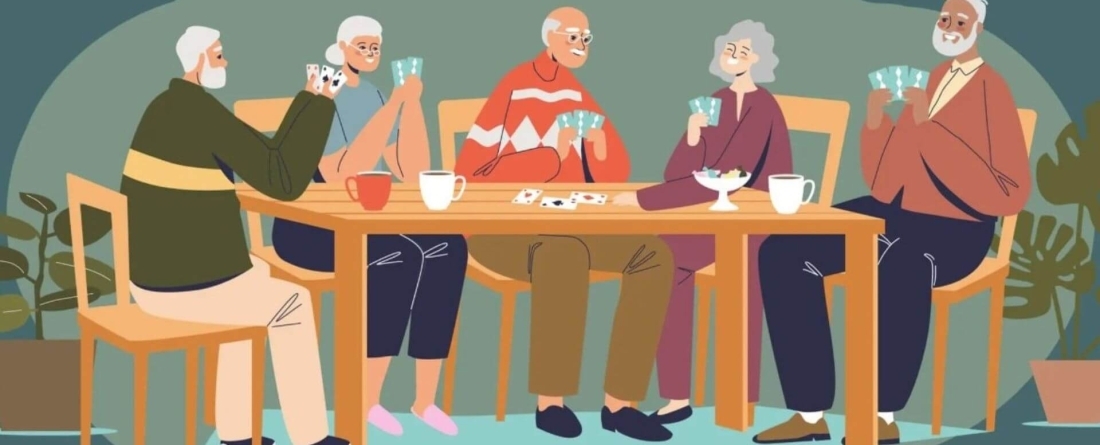
Illustration by iStock
Via Maryland Today / By Lucy Hubbard ’24
When Marie Brodsky ’24’s grandfather moved from his longtime home in Houston to live with her family in Rockville, Md., in early 2021, the University of Maryland math major saw firsthand the isolation and loneliness many older adults face.
Because of a stroke decades earlier, he was physically limited, and he struggled to learn English after immigrating to the U.S. in the 1990s. Now, living in a new city, he suffered an increased sense of social isolation from peers, as well as little knowledge of recreational opportunities or the local transportation system, leading to a withdrawal from the outside world.
“I was sad seeing him in the same spot all the time,” Brodsky said.
That sparked her determination to help older adults like her grandfather stay active and connected with their community. That February, Brodsky and her childhood friend, Sonia Warrior, then a student at Virginia Tech, created a pitch for the Smart City Challenge—a three-week contest to find solutions to challenges in transportation, health care, housing and other municipal concerns.
They initially suggested creating spaces in the city where seniors could connect with each other, and the city of Fairfax, Va., offered the team $9,000 to research and compile resources for the project. That morphed into a beta version of WISE Cities (Where Innovation Supports Everyone), a student-developed web platform that aims to combat social isolation among older adults.
It has since gone on to snag thousands more in funding, including $5,000 last summer in the Terp Startup Accelerator program, $3,000 this semester through the Universities at Shady Grove’s Equity Incubator and a $2,000 award for most potential at the 2023 Universitas 21 Real Impact on Society & Environment (RISE) Showcase & Awards. It was also a finalist at the UMD Do Good Challenge and won the Audience Choice Award at Pitch Dingman, both last semester.
Most recently, the team was accepted into the Terp Startup Fellows program from the Dingman Center for Entrepreneurship, an opportunity that includes up to $20,000 in seed funding, an office space and mentorship.
The WISE Cities team finished the first version of its website in early September and following testing, plans to launch it for Fairfax residents this month.
“It might be good for economic development in a way if we can get this app in here so that seniors are networking by themselves,” said Matt Easley, assistant director, finance and operations in the city’s Office of Economic Development. “Maybe they would network with themselves at a coffee shop.”
No longer focused on creating new physical spaces for seniors to gather, WISE Cities connects people with existing opportunities: transportation options and information about places to go, groups to join or support services to access.
If a user is interested in one of the suggested groups, events or organizations targeted to older adults—whether chess club or tennis practice—the app provides information about how to get there as well. And in a diverse metro area, users have the option of filtering events and groups by one of several languages, including English, Spanish, French, Arabic and Mandarin.
[Pitch Dingman Winner Closes the Hood on Labs’ Energy Waste]
While working on WISE Cities, Brodsky said she was surprised by the range of opportunities hidden in plain sight.
“There isn't a lack of community organizations that are working to support older adults and offering a variety of services,” Brodsky said. “It's that there’s a huge lack of awareness.”
While working on the pilot in Fairfax, Brodsky began to recruit students from UMD as well as the University of Albany, Johns Hopkins University and Virginia Tech to help.
During their research, the team interviewed over 350 business owners, community members and older adults while connecting with four government agencies. The team found that older adults are apprehensive about technology mostly because it was not made with them in mind.
“At the end of the day, technology, when it's designed well, should be easy for anyone to use, regardless of their prior experience level,” said co-founder and product lead Kat Close ’23. “We're still in that transition to getting to a point where technology is usable by anyone without it being frustrating and that’s one of the things that drew me to this project.”
According to Catherine Curtis, a program coordinator for the Do Good Institute who worked with Brodsky on the Do Good Challenge and a mini-grant from the institute, the platform’s practical usability is a big selling point. She also noted the team’s “robust understanding and commitment” to helping the community and letting its members dictate the direction of the project.
“WISE Cities is one of those teams that really exemplifies doing an incredible amount of legwork and research to make sure that their platform is the most effective solution for older adults,” Curtis said.
